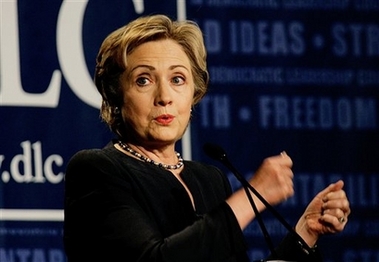New York Sen. Hillary Rodham Clinton, a possible White House contender in
2008, said on Monday the Bush administration had hurt working Americans and
Democrats must offer new ideas to strengthen the middle class.

U.S. Senator Hillary
Rodham Clinton, D-N.Y., addresses the Democratic Leadership Council's
'National Conversation' in Denver, Monday, July 24, 2006. Sen. Clinton,
who led the yearlong effort and also may run for president, was outlining
the specific proposals of the initiative in a speech to nearly 400 local
elected Democratic officials from more than 40 states attending the
organization's annual meeting in Republican-leaning
Colorado.[AP] |
"Americans are earning less while the costs of a middle-class life have
soared," Clinton told the centrist Democratic Leadership Council, a group that
aided her husband Bill Clinton's rise to the presidency in 1992 but has clashed
in recent years with the party's more liberal wing.
"A lot of Americans can't work any harder, borrow any more or save any less,"
she said in unveiling the group's "American Dream Initiative," a package of
proposals to make college and home ownership more affordable, help small
businesses, improve retirement savings and expand health insurance coverage.
Clinton said President George W. Bush and Republicans had "made a mess out of
the country's finances." Rewriting her husband's famous 1992 campaign slogan,
"It's the economy, stupid," she declared: "It's the American dream, stupid."
The yearlong initiative headed by Clinton was designed to give the party new
ideas for midterm elections in November and for the White House race in 2008.
Clinton said she hoped the agenda would "unite Democrats and help elect
Democrats" in November, when the party must pick up 15 seats in the House of
Representatives and six seats in the Senate to regain control of Congress.
"This plan will make the basics of life in the middle class -- health care,
education and retirement -- affordable for those who take responsibility,"
Clinton said.
"These ideas will make sure every American will get a fair wage, access to
college and home ownership and a path out of poverty and into the middle class,"
she said.
Two other possible 2008 presidential contenders, Iowa Gov. Tom Vilsack and
Indiana Sen. Evan Bayh (news, bio, voting record), also addressed the conference
of 375 elected Democratic officials from 42 states.
"Everybody in the country understands what this administration has done
wrong," Vilsack said. "It is important now for this country to understand what
we need to do that's right."
Bayh said Democrats needed to reach out to the middle class if they wanted to
reclaim control of Congress.
Republican National Committee spokesman Danny Diaz rejected the Democratic
claims about the economy.
"Only liberal Democrats like Hillary Clinton could attack an economy that has
produced 5.4 million jobs in the last three years, grew 5.6 percent in the first
quarter, increased payroll employment in 47 states and is the envy of the
industrialized world," he said.
While much of the agenda covers familiar Democratic territory, it adds some
new flourishes. An "American Dream Grant" would award money to states based on
attendance and graduation from state colleges, while American Dream Accounts
would enhance retirement savings and federally funded $500 "baby bonds" would be
issued to each child born in America.
It also includes a commission to evaluate corporate subsidies and new rules
to rein in federal spending.
The agenda is one of several packages of Democratic ideas floated by party
groups and leaders who have yet to rally around a single party-wide agenda
similar to the successful Republican "Contract with America" in
1994.